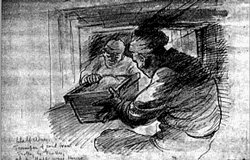I’m watching PBS’s Nova right now, and the episode, “Great Escape,” is a fabulous documentary of the true story of the POW escape from a German camp, as popularized by the excellent 1963 film, The Great Escape.
 One of the things that interests me most is the descriptions of the interactions between the guards and the prisoners. The prisoners had no fear of getting caught when attempting to escape, because the Geneva Convention prevented any harm from befalling them. They received shipments of food from the Red Cross regularly, which included sugar, coffee, raisins, and other goodies that were of a much higher quality than the food consumed by the German army. (Making possible bribery and, thus, their storied escape.) This is a recurring theme of the story of the great escape — the respect with which the prisoners of war were treated by their captors, the humanity of their circumstances, and the strength that they drew from the knowledge of the rules of war established by the Geneva Convention.
One of the things that interests me most is the descriptions of the interactions between the guards and the prisoners. The prisoners had no fear of getting caught when attempting to escape, because the Geneva Convention prevented any harm from befalling them. They received shipments of food from the Red Cross regularly, which included sugar, coffee, raisins, and other goodies that were of a much higher quality than the food consumed by the German army. (Making possible bribery and, thus, their storied escape.) This is a recurring theme of the story of the great escape — the respect with which the prisoners of war were treated by their captors, the humanity of their circumstances, and the strength that they drew from the knowledge of the rules of war established by the Geneva Convention.
This isn’t a 60-year-old concept, though — this was the case just four years ago. As a nation, we understood that our citizens will only be treated as well as we treat the citizens of other nations, and that this was particularly important in times of war.
Today, that’s gone. The Bush administration tossed the Geneva Convention out the window, with Alberto Gonzalez having declared it “quaint” in a memorandum (PDF) to President Bush, justifying the torture and abuse of prisoners at Abu Ghraib and Guantanamo. Having tossed out the Geneva Convention, it’s hard to be shocked when our own soldiers are treated as we treat our opponents.
In the short-term view, Bush’s approach can be understood. Though we might be phenomenally unpopular in the rest of the world, we’re the unchallenged hegemon, and so there’s no immediate danger of large numbers of our troops becoming POWs.
In the long-term view, though, Bush’s approach will cost hundreds, perhaps thousands of lives. Inevitably, at some point, the United States will become caught up in great power politics and clash with a foe on the scale of Nazi Germany. Without the Geneva Convention, our troops will be treated as badly as those of our current foes. A great cry will go up from American citizens, horrified that a nation would treat POWs so poorly. But we have made our bed, and so we must lie.